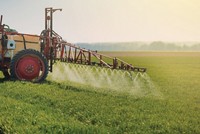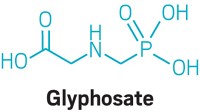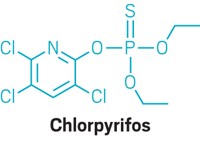Advertisement
Grab your lab coat. Let's get started
Welcome!
Welcome!
Create an account below to get 6 C&EN articles per month, receive newsletters and more - all free.
It seems this is your first time logging in online. Please enter the following information to continue.
As an ACS member you automatically get access to this site. All we need is few more details to create your reading experience.
Not you? Sign in with a different account.
Not you? Sign in with a different account.
ERROR 1
ERROR 1
ERROR 2
ERROR 2
ERROR 2
ERROR 2
ERROR 2
Password and Confirm password must match.
If you have an ACS member number, please enter it here so we can link this account to your membership. (optional)
ERROR 2
ACS values your privacy. By submitting your information, you are gaining access to C&EN and subscribing to our weekly newsletter. We use the information you provide to make your reading experience better, and we will never sell your data to third party members.
Environment
Glyphosate temporarily allowed in EU
Controversial herbicide reauthorized until end of 2017
by Britt E. Erickson
June 30, 2016
| A version of this story appeared in
Volume 94, Issue 27

Despite opposition from some countries, including France and Germany, the European Commission is allowing use of the herbicide glyphosate for up to 18 months. European Commissioner for Health & and Food Safety Vytenis Andriukaitis announced the decision two days before the end of June, when the controversial chemical’s authorization was set to expire.
The temporary reauthorization allows farmers, gardeners, and others in the European Union to continue using glyphosate while the European Chemicals Agency (ECHA) evaluates its potential health effects. ECHA’s assessment is expected by the end of 2017.
Several EU countries are raising concerns about the renewal of glyphosate because of debate over the chemical’s potential to cause cancer. Last year, the World Health Organization’s International Agency for Research on Cancer declared that the herbicide is “probably carcinogenic.” But assessments by the European Food Safety Authority and some EU member countries did not find such a risk.
In addition to temporarily reauthorizing glyphosate, the commission is proposing to ban polyethoxylated tallow amine, a surfactant commonly added to glyphosate-based products to enhance their activity. It also asked member countries to minimize use of glyphosate in public parks and playgrounds. Member countries, however, have not agreed to such restrictions.
Farm groups and pesticide manufacturers are disappointed that glyphosate was renewed only temporarily in the EU, claiming that the decision was based on politics rather than science. The herbicide “meets or exceeds all requirements for renewal under European law and regulation,” says Philip W. Miller, vice president of global regulatory and governmental affairs at Monsanto. Glyphosate is the active ingredient in Monsanto’s widely used Roundup herbicide.
Meanwhile, environmental groups continue to push for a glyphosate ban. “The EU has decided to extend the use of glyphosate without any meaningful restriction,” says Franziska Achterberg, food policy director of Greenpeace EU. She is urging the commission and national and regional governments to “start preparing a glyphosate exit plan as soon as possible.”





Join the conversation
Contact the reporter
Submit a Letter to the Editor for publication
Engage with us on Twitter